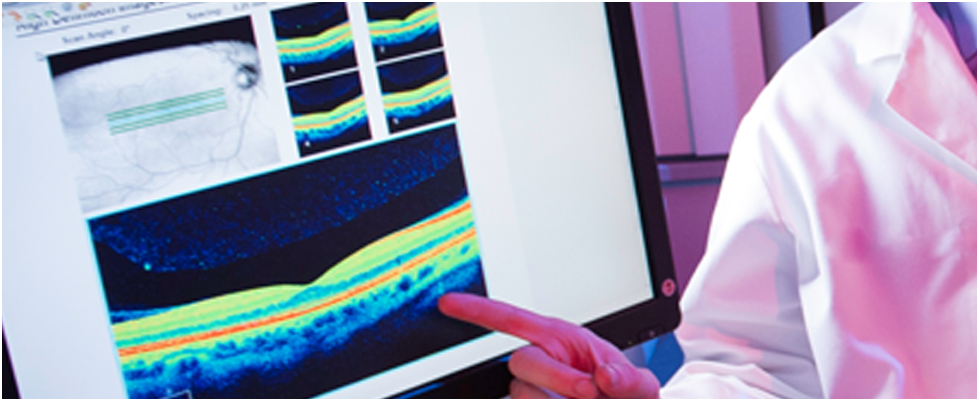Diagnosis of Macular Degeneration
Early detection, accurate diagnosis and quick treatment are the keys to preventing vision loss from age related macular degeneration (AMD). Our eye doctors and retinal specialist have the experience and expertise to provide patients with comprehensive eye exams and testing for macular degeneration diagnosis at Baltimore Washington Eye Center. We ask that patients do their part and have routine eye exams in order to help us help them preserve eye health and vision. By scheduling regular eye exams, you are giving yourself the advantage of allowing your eye doctor to make an early diagnosis of macular degeneration.
More importantly, if at any time you experience any “distortion” or “twisting”, “shadowing” or “bending” of objects in your vision, you should schedule an appointment at Baltimore Washington Eye Center immediately. Be sure to let the receptionist know that you are experiencing these symptoms as they could be an indication of the progression of macular degeneration.
Macular Degeneration Eye Exams
Early macular degeneration diagnosis is possible if you follow some basic guidelines and recommendations. If you are over the age of 50, or younger if you have any risk factors such as
a family history of macular degeneration, prolonged daily use of aspirin, excessive alcohol consumption, smoking or any other types of vascular disease you should make sure that you have a yearly comprehensive dilated eye exam as you may be at greater risk for macular degeneration. Be sure to tell us if you have a family history of macular degeneration. During your eye examination, eye drops will be put in your eyes to dilate your pupils in order to carefully examine the macula and retina using various types of instruments and sources of high magnification.
Macular Degeneration Tests
There are a number of additional tests that your doctor may initially perform to further evaluate the health and integrity of the macula during your eye exam. These can include checking your color vision and an Amsler Grid Test, which helps identify distortion of your central vision, and may be an indication of swelling or fluid under the macula.

Amsler Grid
While it may appear simple, the Amsler Grid Test is actually a very significant test. By using the Amsler Grid, it is possible to detect small changes in your vision that can result from the accumulation of just a small amount of fluid under your macula. Your eye doctor may actually recommend that you take an Amsler Grid home and use it routinely to check for slight changes in your vision. If this is necessary, your eye doctor and staff will supply you with an Amsler Grid and detailed instructions on how to use it.
If we detect any signs of macular degeneration or we believe that you may be at risk for macular degeneration, we will schedule an appointment for you with our Baltimore Washington Eye Center Retina Specialist, as more in depth testing may be necessary. Our Retina Specialist may find it necessary for you to have some specialized color pictures and testing of the macula and retina. The two most common tests are Intravenous Fluorescein Angiogram (IVF) and Optical Coherence Tomography (OCT). During an IVF, a special fluorescent dye is injected into a vein in your arm. By using a high speed digital camera, a series of photographs will be taken in rapid succession as the dye passes throughout the retinal blood vessels. From these pictures the Retina Specialist will be able to see any fluid leakage or new blood vessel growth beneath the retina if it is present. An OCT test does not require any injections. It uses light waves in a fashion similar to ultrasound to very precisely measure your retina. Your eye doctor will be able to see if you have fluid in your retina, and if so, how much. This test is especially useful and sensitive along with the visualization provided by the fluorescein angiogram.
Most important, these tests give us a considerable amount of information regarding whether certain types of treatments such as intravitreal injections of Eylea® or Lucentis® might help stabilize your vision and prevent vision loss. Today, thanks to the advances in treating Wet Macular Degeneration, if caught early, it may be possible to avoid significant vision loss.
Macular Degeneration is a complex eye disease. Fortunately, with early diagnosis it is possible to have a number of treatment options available to help preserve your vision.
If you, a family member, or friend are over 50 and especially if you have a family member who has macular degeneration, or if you have potential risk factors such as prolonged daily use of aspirin, excessive alcohol consumption, smoking or any other type of vascular disease you should make sure that you have a yearly comprehensive dilated eye exam in order to have an early diagnosis of macular of macular degeneration if present. Please schedule an appointment for a macular degeneration eye exam by calling Baltimore Washington Eye Center at 800-495-3937.


